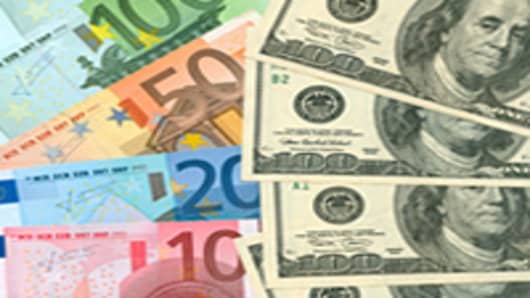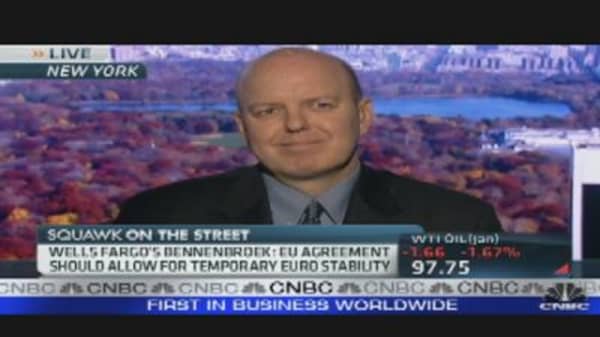The euro could be headed for a long slide—and possibly take stocks and commodities down with it.
The single currency has lost ground rapidly since it became clear Europe has no grand plan to stop the sovereign debt crisis. It tumbled Tuesday to the 1.30 range, its lowest level in 11 months and a key technical zone.
"It certainly has a different flavor from what we've had happening," said Nomura chief G-10 currency strategist Jens Nordvig. "I think we're probably going to consolidate around 1.30 this week, but I wouldn't be surprised if we have a clean break after this."
Nordvig expects to see the euro hit 1.20 in the first quarter of 2012.
The euro is now down more than 3.5 percent this week, picking up downward momentum Tuesday after German Chancellor Angela Merkel voiced opposition to an expansion of the bailout fund, a stance she has made before.
"I think it's the continued negative stream of big headlines. We just don't have a grand solution yet, and it's a combination of technicals," said Nordvig.
The lack of anything on the horizon from European Union policymakers in the near future makes it likely the currency will continue to slide into the new year.
The euro has a tight correlation to other markets and frequently moves in tandem with risk assets, like stocks and commodities. That does not bode well for a "Santa rally," which many analysts had expected to take the stock market higher into the year end.
"I think Europe is going into recession and the ripple effect on global growth next year is the story. People think the U.S. can skate by...To think we can avoid it is delusional," said Peter Boockvar, equity strategist at Miller Tabak.
U.S. stocks have acted better than European shares, as they have been responding to improving economic news in the U.S. Some analysts also note that stocks could be cheered if Congress agrees to extend the payroll tax cut, estimated to be worth a half to full percent of GDP growth
Boockvar, however, sees stocks trending lower into year end.
"The only way we avoid it is if we get the Fed announcing quantitative easing and the ECB printing money in the next couple of weeks," he said.
Marc Chandler, chief currency strategist at Brown Brothers Harriman, said the 60-day correlation between the euro and the S&P 500 is currently 84, close to its recent all-time high of 85.5.
But the 30-day correlation has gone from a peak of 91 percent in early November to 81 percent.
Chandler said the 60-day may follow that same pattern and start to show a decoupling, though he does nto expect to see that immediately. He said it could be that U.S. growth will make the S&P more attractive to fund managers, who have been underweight the U.S., and that could help break the correlation.
Strategists say it is possible the euro could set a new low for the year. It was trading Tuesday at its lowest point since reaching 1.2905 in January.
"We have a year end forecast of 1.29. I don't see any reason to change that yet. We're talking about what's going to happen in Q1 next year, and we think this downtrend will continue even if there's some short covering. We think there's another nickel to come off the euro," Chandler said.
European leaders, at their summit last week, agreed to a tighter plan of fiscal integration, including central authority over budgets and deficits.
"Now, it looks like it wasn't enough for the market," said Mary Nicola, currency strategist with BNP Paribas. "Especially the prospects of anything coming out of the ECB . It looks dimmer and dimmer."
Strategists said the market's biggest disappointment is that the European Central Bank is showing no signs of stepping up its bond purchases, despite the fact that ECB President Mario Draghi signaled the ECB would not expand its purchases after its rate meeting last Thursday. He had led the market to believe the week earlier that the ECB might play a bigger role if the EU leaders took action to create a stronger fiscal union.
"Everyone was hoping if there were some kind of stronger agreement...we'd see some step up in [bond] buying, and there wasn't" any, Nicola said.
The threat of sovereign downgrades also hangs heavy over the euro. Fitch Monday said it did not see a comprehensive solution to the sovereign crisis , and it expects it to continue at varying levels of intensity beyond 2012. It also forecast a significant economic downturn across the euro zone in the near term.
The ECB is "the only truly credible firewall against liquidity and even solvency crisis in Europe," Fitch said. Moody's also commented on the summit's failure to find decisive policy measures to end the crisis and it warned it would review all the EU countries' ratings.
"Unless and until the ECB says they will use their balance sheet, the euro could go down," taking risk assets lower, said Brian Dolan, chief strategist at Forex.com. If the ECB does step in, the Euro could still go down. "But risk would rally," he added.
"We're now running into year end liquidity conditions so the moves can take on outsized volatility," said Dolan.
Nordvig said the ECB could stop the decline if it became aggressive, expanding its balance sheet by buying up more of the debt of Europe's troubled sovereigns. The EU leaders last week also announced the earlier than expected launch of a new permanent bailout fund, the European Stability Mechanism, but markets have been looking for more buying power and Merkel reiterated that the ESM will not be expanded.
Analysts say even a verbal commitment from the ECB to buy more sovereign debt could calm down markets, and bring in sovereign spreads.
Nordvig also said the year end makes for light participation in the foreign exchange market, but a big downward move could bring players back in.
"You also have a considerable short position so that is likely to reduce the downside volatility," Dolan added.
Follow Patti Domm on Twitter: @pattidomm





